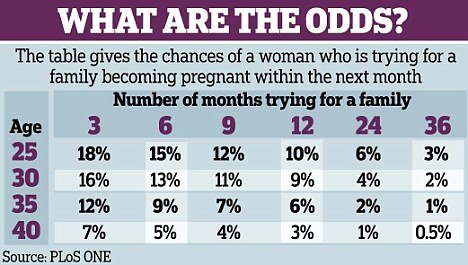Scientists have devised a formula that predicts a woman’s chances of pregnancy.
The formula combines information about how fertility drops with age with the length of time a woman has been trying to start a family, to come up with their odds of conceiving.
For example, they have worked out that the average 25-year-old who has been trying to get pregnant for six months has a 15% chance of doing so in the following month.
By the age of 30, her odds are 13% and, at 35, they have dropped below 10%.
The speeding up of the biological clock mean the chances of pregnancy plummet after 35.
The average 40-year-old who has been trying for six months has just a 5% of getting pregnant in the next month – or odds of one in 20.

The calculations also show that when a woman is 25, it will take 13 months for her odds of conceiving quickly to fall below 10%.
But a 35-year-old woman has just six months before her chances are so slim.
The long-standing rule of thumb is that those trying for a family should wait a year before seeking help, although doctors are increasingly acknowledging the impact of age.
The researchers, from the University of Warwick and the London School of Economics in UK, say that more detailed information could make it easier for couples to discuss fertility issues with their GP.
Professor Geraldine Hartshorne said: “People feel embarrassed and upset and don’t want to go to the doctor. Men, in particular, can be a little bit reluctant.
“As time goes by and people have been trying for a while, they start to get stressed and upset and that can affect their chances of having sex and then becoming pregnant. Approaching a doctor about a personal matter is daunting, so knowing the right time to start investigations would be a useful step forward.”
Writing in the journal PLoS One, Prof. Geraldine Hartshorne also warns that taking too long to conceive could indicate that the resulting pregnancy might be risky.
The work could help doctors to decide whether to refer patients for costly and uncomfortable tests or advise them to keep trying for a baby a little longer.
The researchers have passed their work to the National Institute for Health and Clinical Excellence, which formulates health guidelines. In future, it may be possible to create an online calculator that provides couples with a personalized prediction.
Prof. Geraldine Hartshorne added that factors such as smoking or being fat are “not the most important things” when it comes to conceiving. However, a healthy lifestyle will boost the odds of a healthy baby.
She said: “If your tubes are blocked, giving up smoking really isn’t going to make a difference, but things like smoking and obesity do have important effects when you do get pregnant and in that respect they should be addressed as soon as possible.”
